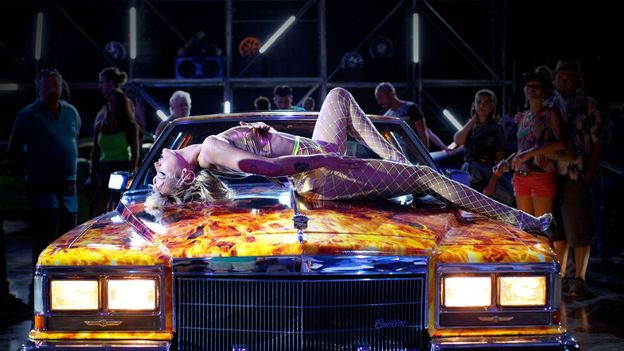
Everyone at the Cannes Film Festival hopes to see something genuinely wild, transgressive, and guaranteed to put them off their dinner. But whenever such a film lurches onto the screen, it's invariably directed by a man: usually Gaspar Noé (Enter the Void, Climax) or Nicolas Winding Refn (Only God Forgives, The Neon Demon). Not anymore. Julia Ducournau, the French writer-director of Raw (2016), is back with a second juicy slice of extreme cinema, Titane, and it's sure to prompt more yelps, winces, groans and uneasy chuckles than anything else at this year's festival – or indeed anywhere else.
More like this:
- Four stars for Wes Anderson's latest
- Five stars for Verhoeven's 'torrid melodrama'
- The most bizarre musical ever made?
Ducournau's beautiful, dark, twisted fantasy is a nightmarish yet mischievously comic barrage of sex, violence, lurid lighting and pounding music. It's also impossible to predict where it's going to go next. The only scene that ends in the way you might expect is the opening one, in which a little girl, Alexia, is misbehaving in the back of the family car. She clambers around and kicks her dad's seat until he turns to snap at her, and – you guessed it – crashes into a concrete barrier. One session of icky, close-up brain surgery later, Alexia has had a titanium plate fitted in her head, which would be enough to put anyone off cars. But the operation has the opposite effect. As soon as she leaves the hospital, she strides away from her parents and hugs and kisses the car instead.
As an adult, she does more than that. In a scene that could be a venomous parody of the Fast & Furious franchise, the camera prowls around a neon-lit motor show where young women pose and writhe on top of the souped-up merchandise – and no one poses and writhes with more frenzied abandon than Alexia, now a punky Tank Girl played by ferocious newcomer Agathe Rousselle. Showing off the curling scar from her brain surgery, and the tattoo on her chest that declares, "Love Is a Dog From Hell", Alexia is a minor celebrity in this sleazy netherworld. She attracts her fellow dancers – Ducournau's version of a rom-com meet cute is when Alexia's hair gets tangled with a colleague's nipple piercing in the showers – as well as an overzealous male fan, whose advances are rewarded with a sharpened metal hair pin jammed in his ear.
Well, then. At this stage you might assume Titane (the French word for titanium) to be a grisly thriller in which a vengeful vigilante dispatches predatory men. But a fabulously farcical set piece establishes that Alexia will butcher anyone who catches her on a bad day, predatory or otherwise. Oh, and did I mention that she is pregnant with the offspring of a car that she had sex with, and that she is lactating ink-black oil?
Revising your preconceptions at frantic speed, you might decide that Titane is a Cronenberg-ish sci-fi body horror crossbred with a Tarantino-esque caper about a natural-born serial killer. But not even that gonzo definition will suffice. On the run, our scowling anti-heroine chops off her hair, breaks her own nose (I told you about the winces), and passes herself off as a boy who disappeared a decade earlier. The next twist is that the boy's tough-but-tender father, Vincent (Vincent Lindon), takes her at her word. He drives her back to the fire station under his command and introduces her to a sceptical team of hunky fire fighters. To maintain her new male identity, Alexia has to bind her oily breasts and her swelling stomach, but Vincent injects steroids into his bruised buttocks every night, so who's counting? The point is that Titane has mutated into a warm redemption story of gender fluidity, body modification, and plenty more besides.
One of the impressive aspects of this delirious, nocturnal trip through a purgatory of bone-crunching fights and skin-splitting transformation is that it's never as off-putting as all that might suggest. The storytelling is lucid and propulsive, so you are always clear on what's happening, even if you aren't clear on why, and the gore is balanced by humour and even levity, so you smile as well as retch.
I'm not sure what the message of Titane might be, or why Ducournau has sewn together a Frankenstein's monster from so many disparate ideas, or whether Alexia's feverish journey relates to any recognisable, non-psychopathic emotions except a parent's all-consuming yearning to be reunited with a lost child (the theme of another surreal film that premiered at Cannes this year, Valdimar Jóhannsson's Lamb). It's definitely less focused than Raw, but I admired the way Titane kept me guessing and gasping, and the way it revealed glimmers of compassion beneath its spiky, bodily fluid-dripping surface. Whatever you think of it, no one is going to roll their eyes and grumble, "Huh – not another genre mash-up about a homicidal lesbian cyborg fostering a quasi-incestuous relationship with the delusional father of the man she is pretending to be." Ducournau has driven to the boundaries of conventional cinema – and then put her foot down.
★★★★☆
Love film? Join BBC Culture Film Club on Facebook, a community for film fanatics all over the world.
If you would like to comment on this story or anything else you have seen on BBC Culture, head over to our Facebook page or message us on Twitter.
And if you liked this story, sign up for the weekly bbc.com features newsletter, called The Essential List. A handpicked selection of stories from BBC Future, Culture, WorkLife and Travel, delivered to your inbox every Friday.
https://ift.tt/3yUX7W2
Film
Bagikan Berita Ini














0 Response to "Titane: The most shocking film of 2021 - BBC News"
Post a Comment